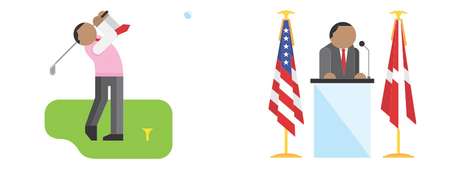Obama's first year / Washington
Hope, still
Barack Obama may not yet have brought about as much change as promised, but he himself has certainly changed. He has learnt that he will have to fight dirty to get things done – and this means his first year in office can be deemed a success.
Only one year later, it is hard to recall Barack Obama’s inauguration without feeling the onset of premature nostalgia. The earnest applause then seems so naive now, celebrating the new president’s pronouncements that “we have chosen hope over fear, unity of purpose over conflict and discord”.
A year later, it is clear Obama has done little to change the hope-fear equation that drives American politics. While conflict and discord may have taken a holiday for Obama’s swearing-in – Republicans were briefly cowed by the scope of his victory – they again carry the day. The idealistic rhetoric that made Obama’s inaugural speech so thrilling has already failed him. Politics, alas, has not changed, but Obama has, and his first year is actually starting to look like a success.
The best news from Washington may be that Obama has turned out to be as ruthless and tactical as the old-style power brokers he claims to have abhorred. In his early weeks, he passed a massive $787bn (€533bn) collection of tax cuts and spending that started moving towards fresh priorities in transport and energy technology. The Democrats’ bill to mandate universal health coverage (and defend consumers from insurers) moved fitfully through Congress, but its passage amounts to the biggest victory for American liberals since the young Obama himself first waddled off to a Honolulu primary school.
“I won’t stand here and pretend that any of this will be easy,” candidate Obama liked to say as he recited versions of these proposals as campaign pledges. But supporters certainly came away with the impression that “change” would be easy, and that the only necessary ingredient was charismatic, open-minded leadership.
Governing, it turns out, is hard business. Obama has postponed a self-imposed deadline to close Guantanamo Bay detention camp and has held on to some of George W Bush’s policies on handling detainees. Perhaps his most promising change of domestic priorities, a five-year $13bn (€8.8bn) investment to kick-start American high-speed rail, has languished. After requesting bids from local governments for rail grants, administration officials sat on the money for months without distributing it.
“What the cynics fail to understand,” Obama said upon taking office, “is that the ground has shifted beneath them, that the stale political arguments that have consumed us for so long no longer apply.” If the old political arguments don’t apply, it is because Obama has dodged them.



He has done little to change the status of gay couples or to allow gay soldiers to serve openly. He went to December’s COP15 conference in Copenhagen with a weak negotiating hand because he chose to hold off on pushing Congress to pass an unpopular bill to regulate carbon emissions. In addition, he treats the old causes of the American left like distractions: when a Kansas abortion doctor was assassinated, Obama did not use the occasion to talk about abortion or gun control.
The ground does not move easily; thankfully, Obama has become comfortable dirtying himself in it. He vowed to ban lobbyists from administration posts; now his White House acknowledges some former lobbyists are indispensable experts. He said he would broadcast legislative negotiations online and wait three days before signing a bill so citizens could read it; neither policy has survived. In politics, secrecy and surprise have their uses; charm and good intentions their limits. International admirers are still living in the glow of Obama’s swearing-in, and he still likes big speeches about his grandest ambitions; reducing the world’s nuclear arsenal and engaging the Muslim world. His un-Bush-like posture has improved the American image but it is unclear how that strengthens national policy. He has been unwilling to assert himself as a regional leader (he was quiet after a coup in Honduras), unable to sway long-time friends (Israel disregarded his anti-settlement demands) and unsuccessful as a coalition builder (allies have been reluctant to commit troops for Afghanistan).
But if soft power is Obama’s favoured tool abroad, he goes hard at home. Symbolic gestures towards Republicans – including invitations to White House cocktails – held opponents at bay only until they realised they were defying Obama’s agenda because they disagreed with it. Now the cocktail invitations have slowed, along with the prayers to the god of bipartisanship. Obama appears to have learned that eventually there are two options: you can persuade your opponents, or you can defeat them.
Report card
The President's first year in the office
Economy: B
The Democrats’ stimulus bill probably helped to hold off a depression and continued bailouts have kept banks in business – even if they are still not lending enough to inspire entrepreneurship. Obama’s decision to aid failing American car companies, however, seems like a short-sighted fix.
Health: B+
Health-insurance reform was an Obama priority but he left the details to Congress. The result, after complex negotiations and compromise, is a flawed bill that nonetheless will revolutionise the way many Americans receive and pay for their medical care.
Environment: C+
The White House gave up on early plans to push a climate bill through Congress in time for the COP15 talks, knowing it would complicate efforts to reform the health and financial sectors. Obama went to Copenhagen with the right words but little ability to negotiate.
Foreign policy: B+
The return of American realism is encouraging but, in key areas, not much has changed. Obama has still to prove that Netanyahu, Karzai and Ahmadinejad should fear him, and let us know whether his symbolic gestures – rebuffing the Dalai Lama, bowing to Saudi King Abdullah – should be taken seriously.
Cities: C+
Obama created the first urban-affairs office within the White House but the man he named to run it, Adolfo Carrión, has been invisible. So, too, are the transformational changes that transport secretary Ray LaHood has promised to the country’s rails and pavements.
Hiring: B+
Obama has put together an impressive staff, from top Cabinet secretaries Robert Gates and Hillary Clinton down to less famous policy hands within their departments. More impressively, his “no drama” edicts appear to have kept any infighting out of the papers.
Reform: C
White House advisers take polls, use their findings to change the president’s words and direct the Democratic Party’s political affairs. None of this is new – and some of it is essential to successful governance – but it sounded scandalous when described by candidate Obama.
Personal style: B-
Enough has been written about Obama’s grace and intellect but can we note that he seems not to have a whit of wit about him? He laughs at the punchlines speechwriters draft for him and does not seem able to craft his own. And his good suits have given way to mom-style jeans.
National brand: A
This was quite easy after Bush (John McCain would probably have got at least a B) but Obama’s internationalist posture has made the US more likeable abroad. His second year, with an expanded war in Afghanistan and no quick end to Guantanamo, will be tougher.
Culture: B
For all the worldliness of his pedigree, Obama has fairly prosaic tastes: America has another president who likes burgers and playing golf. The job of bringing culture to the White House has fallen to the First Lady, who has curated concert nights and talks incessantly about food.
Rhetoric: C+
Whenever he has a big problem, abroad or at home, Obama gives a big speech. They are usually satisfying at the time, but barely a single line from any of them is memorable a day later.


